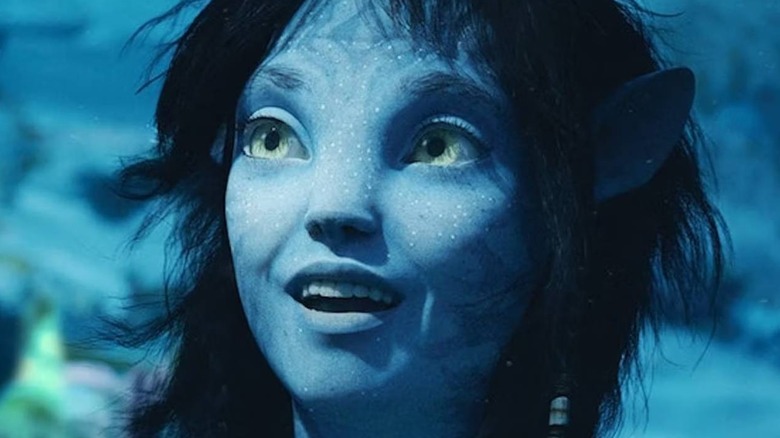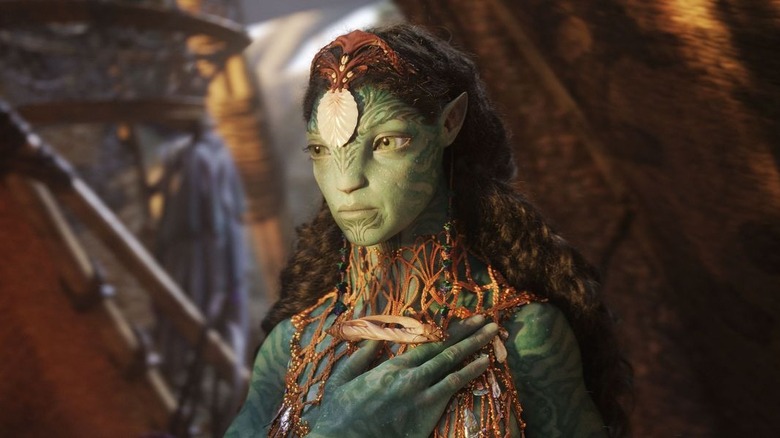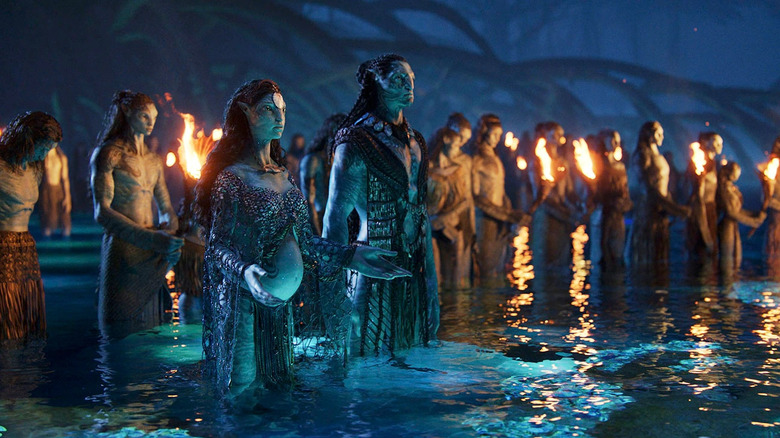Avatar: The Way Of Water Is Hiding An Uncomfortable Message For The Age Of Covid
The following contains spoilers for "Avatar: The Way of Water."
"Avatar: The Way of Water" is finally in theaters, and some might call it the blockbuster we need right now. Audiences and critics alike have raved about the film's visuals, with James Cameron and team mastering the art of having CGI creations swim around in water (via The New York Times). The Na'vi look like real people you can reach out and touch thanks to advancements in 3D, proving that movies can be more than heroes in CGI suits fighting gray blobs.
There's also a poignant message about ecological preservation. Much like the first "Avatar," "The Way of Water" has an environmental message, but this time around, it can basically be summarized as how important it is to save the whales. In the movie, humans hunt ocean creatures called tulkuns that are even smarter than humans. And it's all done in service of extracting a material out of the tulkun brain that reverses the aging process.
However, while "The Way of Water" seems to be caught up with the times, there is one noticeably peculiar sequence, especially given the fact the world still finds itself under the threat of COVID-19.
Holistic remedies are successful in lieu of medicine
In "Avatar: The Way of Water," Kiri (Sigourney Weaver) has a vision after bonding with the Metkayina's Spirit Tree. Not long after that, she experiences a seizure and has to be rushed back to the surface. Dr. Norm Spellman (Joel David Moore) and Dr. Max Patel (Dileep Rao) meet with Kiri and her family afterward and administer medicine. The only problem is that it doesn't appear to work; that's when Ronal (Kate Winslet) enters the hut with all-natural medicine and appears upset that the Na'vi are trusting the humans with the well-being of the child.
The humans eventually step aside and allow Ronal to use her treatments, which work after some time. The message of the sequence appears clear — western medicine didn't have any effect on the young girl, but natural remedies worked just fine. The movie seems to prefer promoting holistic medicine over more advanced methods, and that creates problems in a post-COVID world.
Conventional medicine shouldn't be feared
Holistic medicine certainly has its place in remedies. However, when dealing with public health crises on the macro scale, traditional medicine is essential. Certain herbs and oils might be able to help with sunburn, but the only way to effectively address a pandemic is through the mass distribution of vaccines. "The Way of Water" scene seems to scoff at Western medicine in favor of holistic treatments, and in the era of COVID, that can be a dangerous message to spread, especially given the rise of vaccine hesitancy.
The World Health Organization categorized vaccine hesitancy as one of the top threats to global health in January 2019, nearly a year before COVID-19 would strike the globe (via NBC News). It's clear millions of people are reluctant to accept vaccines and other forms of healthcare simply because they don't trust it. The reasons for this are complex, and having a major motion picture depict such advancements failing while natural remedies work may only worsen the divide.
This is particularly troublesome in a world where various snake oils are peddled to the masses to cure diseases. A ton of misinformation persists, especially as it pertains to the antiparasitic ivermectin being promoted as a cure for not only COVID-19 but also cancers (via Politico). People need to be able to trust conventional medicine in this day and age, not worry about it more. "The Way of Water" scene may have seemed well-intentioned, but it could have wide-ranging side effects of people being warier of medicine for fear that it either won't work or make matters worse. Holistic therapy has its place, but people shouldn't be afraid or skeptical of science. It's the only way to be prepared for the next pandemic.


